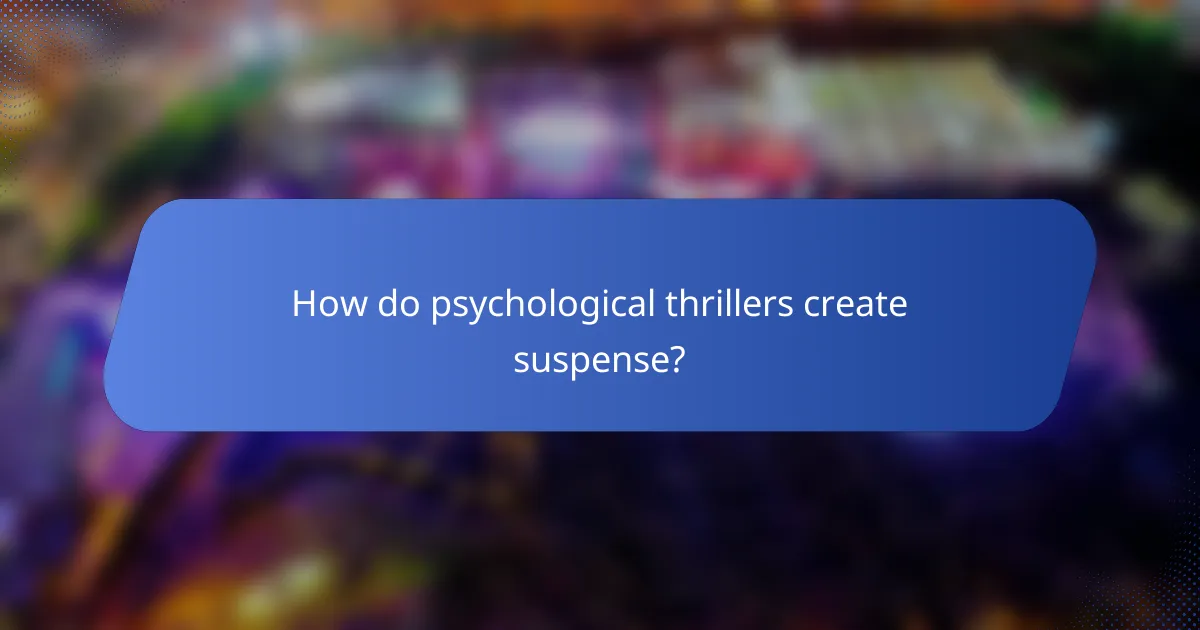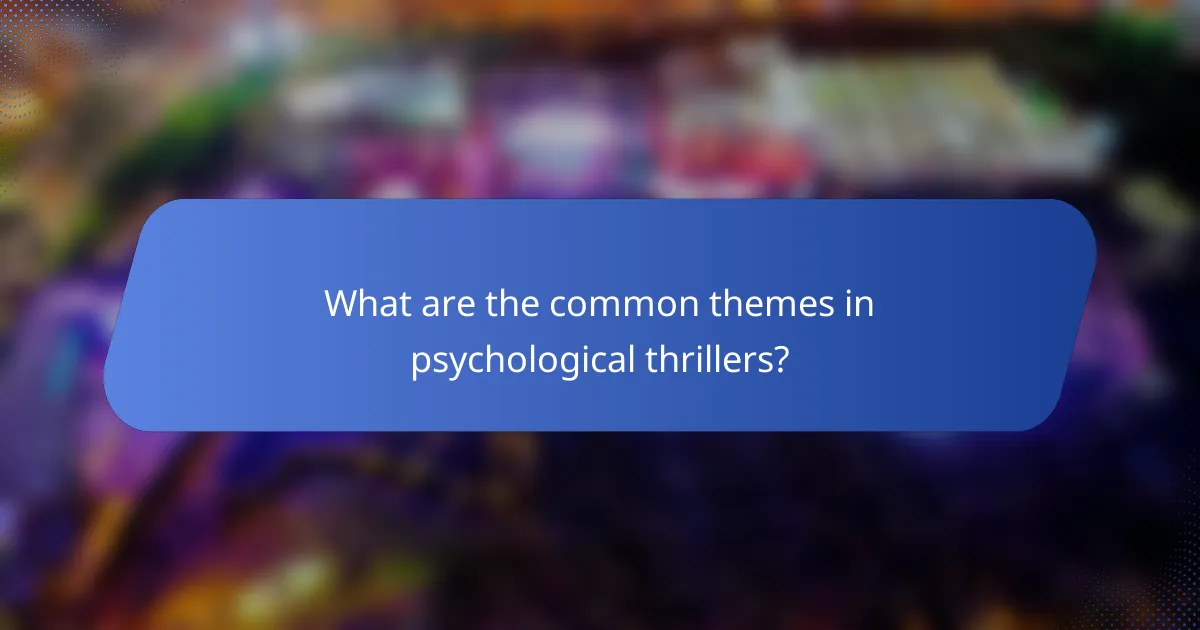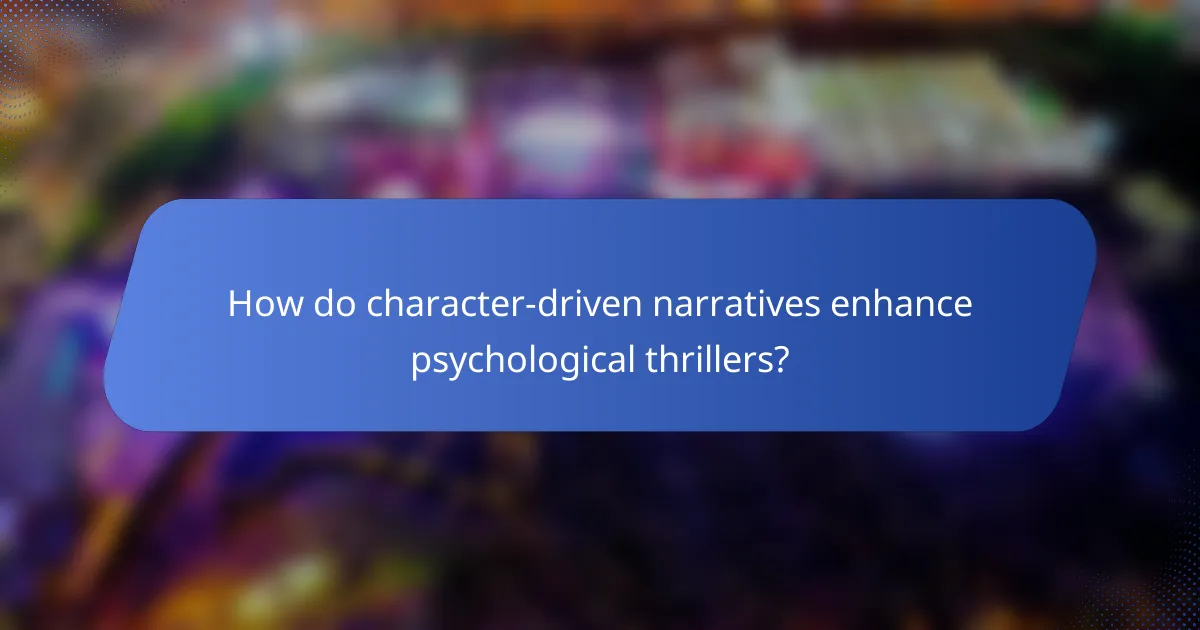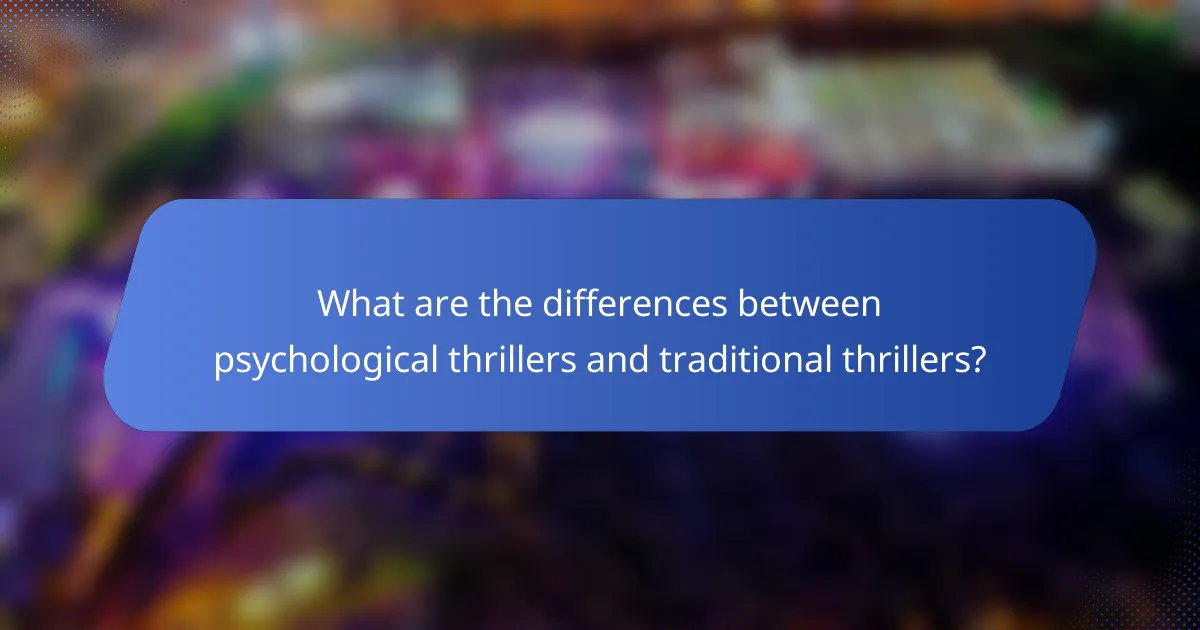Psychological thrillers captivate readers with their intricate exploration of the human mind, weaving suspenseful plots that hinge on character-driven narratives. These stories often feature unexpected twists and unreliable narrators, compelling readers to question motives and outcomes. By delving into themes of isolation, mental illness, and manipulation, these novels create a gripping atmosphere that keeps audiences on the edge of their seats.

What are the best psychological thrillers to read in Canada?
Some of the best psychological thrillers to read in Canada include gripping narratives that delve into the complexities of the human mind and relationships. These novels often feature suspenseful plots and character-driven stories that keep readers on the edge of their seats.
Gone Girl by Gillian Flynn
“Gone Girl” is a masterclass in psychological manipulation and unreliable narration. The story follows Nick and Amy Dunne, whose marriage takes a dark turn when Amy goes missing, leading to a media frenzy and police investigation that reveals shocking truths.
Flynn’s writing intricately explores themes of deception and the facades people maintain. Readers are drawn into the mind games between the characters, making it a compelling read for anyone interested in psychological tension.
The Girl on the Train by Paula Hawkins
“The Girl on the Train” centers on Rachel, an alcoholic who becomes entangled in a missing persons investigation after witnessing something suspicious from her train commute. The narrative unfolds through multiple perspectives, adding layers of complexity and suspense.
This novel effectively captures the themes of obsession and memory, making readers question the reliability of the narrator. Its gripping plot and character depth make it a standout in the psychological thriller genre.
Behind Closed Doors by B.A. Paris
“Behind Closed Doors” tells the story of Jack and Grace, a seemingly perfect couple whose relationship hides dark secrets. The novel explores the themes of control and abuse, revealing the chilling reality behind their facade of happiness.
Paris’s ability to create tension and evoke empathy for the characters makes this book a powerful exploration of domestic life and psychological manipulation. It’s a must-read for those who appreciate thrillers that delve into the darker aspects of human relationships.

How do psychological thrillers create suspense?
Psychological thrillers create suspense through intricate character development, unexpected plot twists, and the use of unreliable narrators. These elements work together to keep readers on edge, questioning motives and outcomes as the story unfolds.
Unreliable narrators
Unreliable narrators are a hallmark of psychological thrillers, as they distort reality and challenge the reader’s perception. This technique can lead to a sense of confusion and intrigue, compelling readers to piece together the truth from misleading information. For example, a narrator may omit key details or present events in a biased manner, forcing the audience to question their credibility.
Writers often use this device to create tension and deepen character complexity. By revealing the narrator’s flaws or hidden agendas, the story becomes more engaging, as readers must navigate through layers of deception to uncover the actual narrative.
Twists and turns in the plot
Twists and turns are essential for maintaining suspense in psychological thrillers, as they introduce unexpected developments that keep readers guessing. These plot twists can range from shocking revelations about a character’s past to sudden changes in alliances, which can alter the story’s direction dramatically. A well-placed twist can transform a seemingly straightforward narrative into a complex web of intrigue.
To effectively utilize twists, authors often plant subtle clues throughout the story, allowing attentive readers to piece together the puzzle before the big reveal. However, it’s crucial to balance surprise with plausibility; twists should feel earned rather than contrived to maintain reader engagement and satisfaction.

What are the common themes in psychological thrillers?
Psychological thrillers often explore themes such as isolation, mental illness, and manipulation. These elements create suspenseful plots that delve into the complexities of the human mind and the darker aspects of human behavior.
Isolation and paranoia
Isolation and paranoia are central to many psychological thrillers, creating an atmosphere of tension and fear. Characters often find themselves cut off from support systems, leading to heightened anxiety and distrust of others.
This theme can manifest in various settings, from remote locations to urban environments where characters feel emotionally disconnected. For example, a protagonist trapped in a secluded cabin may become increasingly paranoid about the intentions of a mysterious visitor.
Mental illness
Mental illness is frequently portrayed in psychological thrillers, adding depth to character development and plot twists. These narratives often challenge perceptions of sanity, blurring the lines between reality and delusion.
Writers may depict characters struggling with conditions such as depression, anxiety, or schizophrenia, which can lead to unpredictable behavior. This complexity invites readers to empathize with the character’s plight while questioning their reliability as narrators.
Manipulation and control
Manipulation and control are key dynamics in psychological thrillers, often driving the plot forward. Characters may engage in deceitful tactics to gain power over others, leading to intense confrontations and moral dilemmas.
This theme can be illustrated through relationships where one character exploits the vulnerabilities of another, creating a cat-and-mouse game. For instance, a master manipulator may use psychological tactics to instill fear, forcing the victim to comply with their demands.

How do character-driven narratives enhance psychological thrillers?
Character-driven narratives significantly enhance psychological thrillers by creating deep emotional connections and driving suspense through complex motivations. These narratives focus on the psychological depth of characters, making their actions and decisions pivotal to the plot’s tension and intrigue.
Deep character development
Deep character development allows readers to understand the inner workings of a character’s mind, which is essential in psychological thrillers. By exploring their fears, desires, and moral dilemmas, authors can create multi-dimensional characters that evoke empathy and tension. For example, a protagonist grappling with guilt over a past decision can lead to suspenseful moments as their past resurfaces.
To effectively develop characters, writers should consider backstory, personality traits, and emotional arcs. This can involve revealing secrets gradually or showcasing how a character’s past influences their present decisions. Engaging readers with relatable struggles makes the narrative more compelling and heightens the psychological stakes.
Complex relationships
Complex relationships between characters add layers of intrigue and conflict in psychological thrillers. These relationships often involve manipulation, betrayal, or hidden agendas, which can drive the plot forward and keep readers guessing. For instance, a seemingly supportive friend might have ulterior motives, creating a sense of paranoia and suspense.
To craft these intricate dynamics, authors should focus on how characters interact and influence one another. This can include dialogue that hints at deeper issues or situations that test loyalties. By portraying relationships as multifaceted, writers can enhance the psychological tension and create a more immersive reading experience.

What are the key elements of a psychological thriller?
Key elements of a psychological thriller include suspenseful pacing, psychological depth, and surprising endings. These components work together to create an intense atmosphere that keeps readers engaged and guessing until the final pages.
Suspenseful pacing
Suspenseful pacing is crucial in a psychological thriller, as it builds tension and keeps the audience on edge. Authors often use short chapters, cliffhangers, and alternating perspectives to maintain a brisk tempo that heightens anticipation.
To effectively manage pacing, consider varying the rhythm of your narrative. Slow down during critical emotional moments to deepen character development, then accelerate during action sequences to create urgency. This balance can enhance the overall suspense.
Psychological depth
Psychological depth involves exploring the inner workings of characters’ minds, their motivations, and their fears. This depth allows readers to connect with characters on a personal level, making their struggles and decisions more impactful.
Incorporating elements such as unreliable narrators, complex backstories, and moral dilemmas can enrich psychological depth. For instance, a character grappling with guilt or trauma can evoke empathy and provoke thought, drawing readers deeper into the narrative.
Surprising endings
Surprising endings are a hallmark of psychological thrillers, often leaving readers shocked or re-evaluating the entire story. These twists can reveal hidden truths or challenge initial perceptions, making the conclusion memorable.
To craft an effective surprise ending, plant subtle clues throughout the story that, upon reflection, make sense but remain obscured until the final reveal. This technique not only enhances satisfaction but also encourages readers to revisit the narrative for missed details.

How to choose a psychological thriller for your book club?
Choosing a psychological thriller for your book club involves selecting a story that offers depth, suspense, and rich themes for discussion. Look for narratives that engage the mind and provoke strong emotional responses, ensuring everyone can contribute to the conversation.
Consider themes and discussion potential
When selecting a psychological thriller, consider the underlying themes such as trust, betrayal, and the complexity of the human mind. These themes often lead to engaging discussions, allowing members to explore characters’ motivations and moral dilemmas.
Evaluate how well the book can provoke debate. For instance, stories that challenge perceptions of reality or morality can spark lively conversations. Aim for titles that encourage differing viewpoints and personal reflections.
Look for popular titles
Focusing on well-known psychological thrillers can enhance your book club experience, as many members may already be familiar with the titles. Popular books often come with a wealth of online resources, including discussion questions and reviews, which can enrich your meetings.
Consider recent bestsellers or award-winning novels in the genre. Titles like “The Girl on the Train” or “Gone Girl” have proven to be engaging for readers, providing ample material for analysis and conversation. Check platforms like Goodreads or local bestseller lists to find current favorites.

What are the differences between psychological thrillers and traditional thrillers?
Psychological thrillers focus on the mental and emotional states of characters, while traditional thrillers prioritize action and plot-driven suspense. The former delves into the complexities of the human mind, often exploring themes of manipulation, fear, and moral ambiguity.
Focus on character psychology
In psychological thrillers, character psychology is central to the narrative. The motivations, fears, and inner conflicts of characters drive the plot, creating a deeper connection with the audience. Readers often find themselves questioning the reliability of characters, which adds layers of suspense.
For example, a protagonist may struggle with past trauma that influences their decisions, leading to unpredictable outcomes. This focus on psychological depth distinguishes these stories from traditional thrillers, where characters may serve more as archetypes than complex individuals.
Writers should aim to develop rich backstories and emotional arcs for their characters. This can involve exploring their relationships, fears, and desires, which can enhance the tension and engagement throughout the story.










